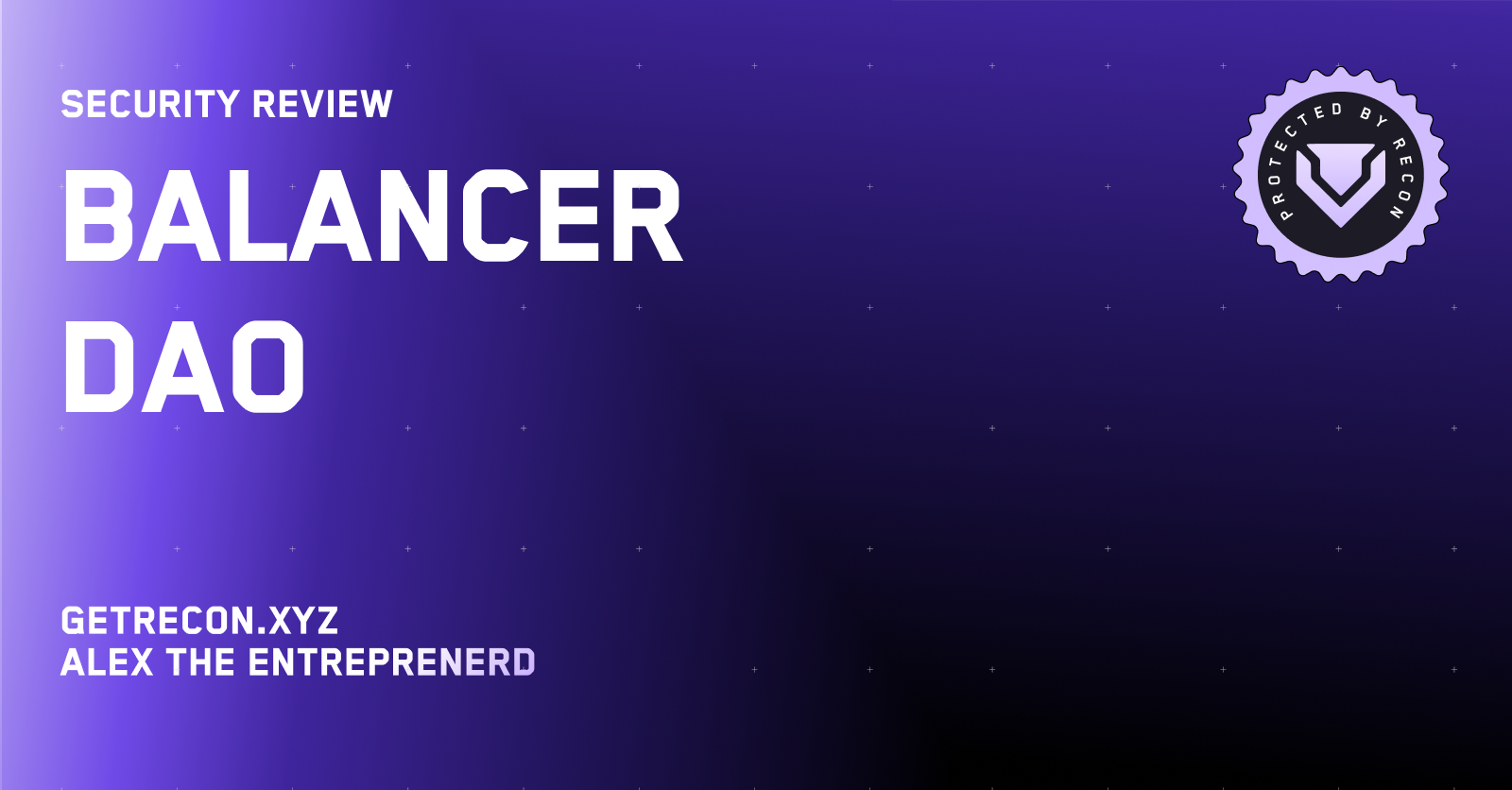Alex The Entreprenerd performed a 1 day review of Aura Locker V2 for Balancer DAO
Repo: https://github.com/onchainification/aura_locker_v2
Commit Hash:
07294ae3638909ecd768a6a0f831fa513abe91a0
This review uses Code4rena Severity Classification
The Review is done as a best effort service, while a lot of time and attention was dedicated to the security review, it cannot guarantee that no bug is left
As a general rule we always recommend doing one additional security review until no bugs are found, this in conjunction with a Guarded Launch and a Bug Bounty can help further reduce the likelihood that any specific bug was missed
Recon offers boutique security reviews, invariant testing development and is pioneering Cloud Fuzzing as a best practice by offering Recon Pro, the most complete tool to run tools such as Echidna, Medusa, Foundry, Kontrol and Halmos in the cloud with just a few clicks
Alex is a well known Security Researcher that has collaborated with multiple contest firms such as:
- Code4rena - One of the most prolific and respected judges, won the Tapioca contest, at the time the 3rd highest contest pot ever
- Spearbit - Have done reviews for Tapioca, Threshold USD, Velodrome and more
- Recon - Centrifuge Invariant Testing Suite, Corn, Badger and Liquity invariants as well as live monitoring
- QA
- Q-01 Executive Summary
- Q-02 Operative Gotcha - Safe.getModules is limited to the first 10 modules
- Info
- I-01 Nitpick:
SAFEandBALANCER_MULTISIGare the same value and are used inconsistently - I-02 Address Checks
- I-01 Nitpick:
- Gas
- G-01 GAS: Can skip check to save 200 gas
The module allows a registered chainlink upkeep to automatically re-lock aura locks
Funds cannot be stolen in any way
Due to the lax timing and lack of MEV, I cannot expect the upkeep to cause any particular issue
It's worth noting that in case you want to deprecate the module, for example to stop re-locking, it will be sufficient to remove it from the safe modules
There is no particular risk tied to adding this module as in the worst case it will consume a bit of LINK token to perform the upkeep
_isModuleEnabled is written as follows:
/// @dev The Gnosis Safe v1.1.1 does not yet have the `isModuleEnabled` method, so we need a workaround
function _isModuleEnabled() internal view returns (bool) {
address[] memory modules = SAFE.getModules();
for (uint256 i = 0; i < modules.length; i++) {
if (modules[i] == address(this)) return true;
}
return false;
}Which uses getModules, which is paginated and limited to the first 10 enabled modules
https://etherscan.io/address/0x34cfac646f301356faa8b21e94227e3583fe3f5f#code
function getModules()
public
view
returns (address[] memory)
{
(address[] memory array,) = getModulesPaginated(SENTINEL_MODULES, 10);
return array;
}It's worth noting that if this module where to be used with a lot of other modules setup, the check could fail
However, current there are no other modules set, meaning that the code is safe as is
Additionally, even if the check were to fail, no particular damage would be caused to the Safe, at worst the checkUpkeep would always return false, making no upkeep run, but causing no DOS to the Safe
Add a comment to the module and make sure to have less than 10 modules
The casting of address(SAFE)) are unnecessary if you use BALANCER_MULTISIG
address public constant BALANCER_MULTISIG = 0x10A19e7eE7d7F8a52822f6817de8ea18204F2e4f;
IGnosisSafe public constant SAFE = IGnosisSafe(payable(BALANCER_MULTISIG));Which is what's done in onlyGovernance
/// @notice Enforce that the function is called by governance only
modifier onlyGovernance() {
if (msg.sender != BALANCER_MULTISIG) revert NotGovernance(msg.sender);
_;
}You could alternatively change onlyGovernance to use address(SAFE) and make the code consistent
This has no impact on the bytecode so it's not a big deal
The addresses are correctly set
address public constant BALANCER_MULTISIG = 0x10A19e7eE7d7F8a52822f6817de8ea18204F2e4f Confirmed, 6/11 multi https://etherscan.io/address/0x10A19e7eE7d7F8a52822f6817de8ea18204F2e4f#code
IERC20 public constant AURA = IERC20(0xC0c293ce456fF0ED870ADd98a0828Dd4d2903DBF); // OK https://etherscan.io/address/0xC0c293ce456fF0ED870ADd98a0828Dd4d2903DBF#code
ILockAura public constant AURA_LOCKER = ILockAura(0x3Fa73f1E5d8A792C80F426fc8F84FBF7Ce9bBCAC); // OK https://etherscan.io/address/0x3Fa73f1E5d8A792C80F426fc8F84FBF7Ce9bBCAC#code
performUpkeep has a check to verify if there's any re-lockable balance
/// @notice The actual execution of the action determined by the `checkUpkeep` method (AURA locking)
function performUpkeep(bytes calldata /* _performData */ ) external override onlyKeeper {
if (!_isModuleEnabled()) revert ModuleNotEnabled();
(, uint256 unlockable,,) = AURA_LOCKER.lockedBalances(address(SAFE));
if (unlockable == 0) revert NothingToLock(block.timestamp);If the check fails, the call will revert.
However, vlAURA already has this check
https://etherscan.io/address/0x3Fa73f1E5d8A792C80F426fc8F84FBF7Ce9bBCAC#code
function _processExpiredLocks(
address _account,
bool _relock,
address _rewardAddress,
uint256 _checkDelay
) internal updateReward(_account) {
/// OMITTED
require(length > 0, "no locks"); /// @audit Reverts hereMeaning you can skip the call to save around 200 gas
Consider removing the check to save 200 gas
Recon offers:
- Ongoing advisory and invariant testing - Ask about Recon Legendary
- Cloud Fuzzing as a Service - The easiest way to run invariant tests in the cloud - Ask about Recon Pro
- Security Reviews by Alex The Entreprenerd and the Recon Team
